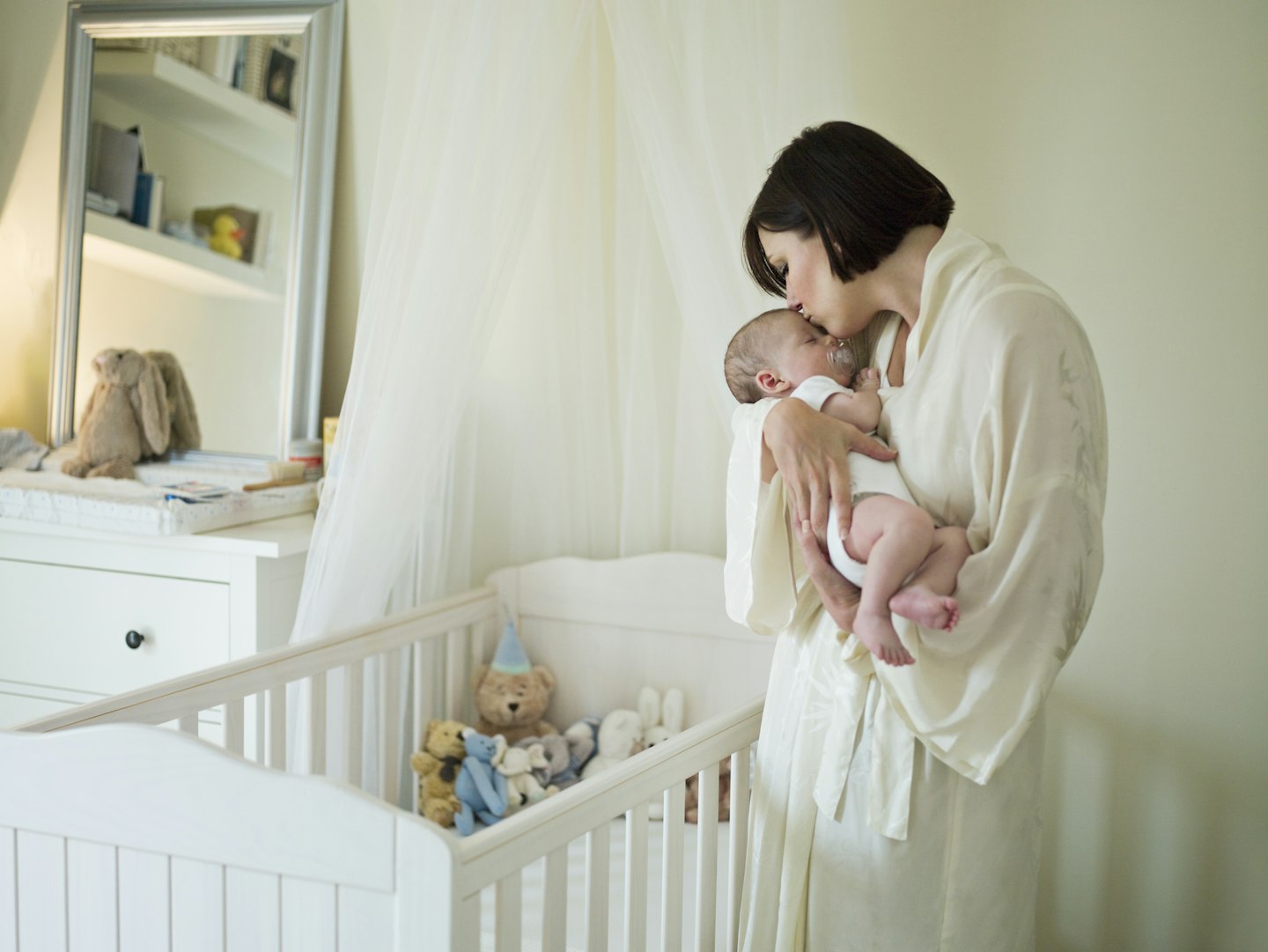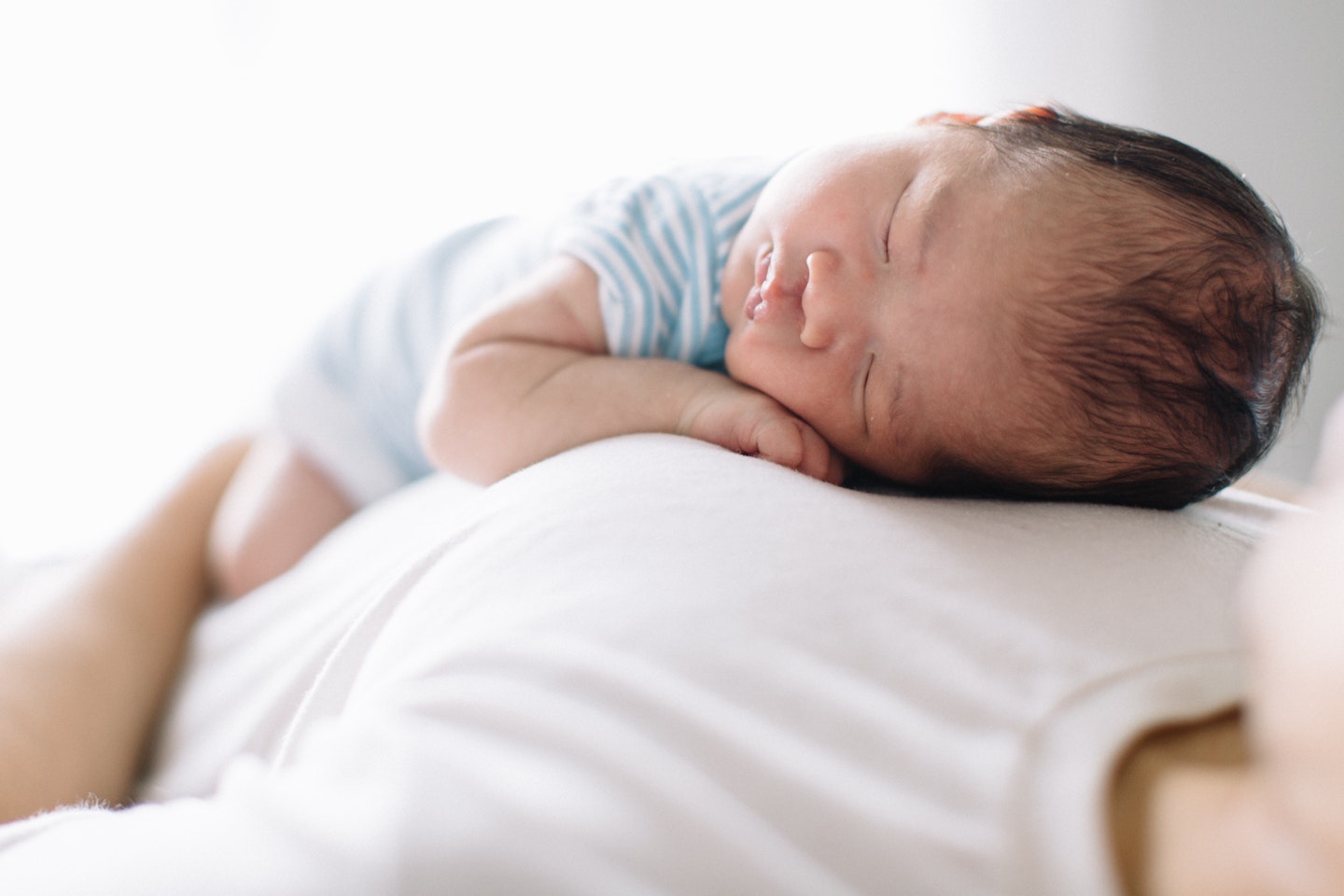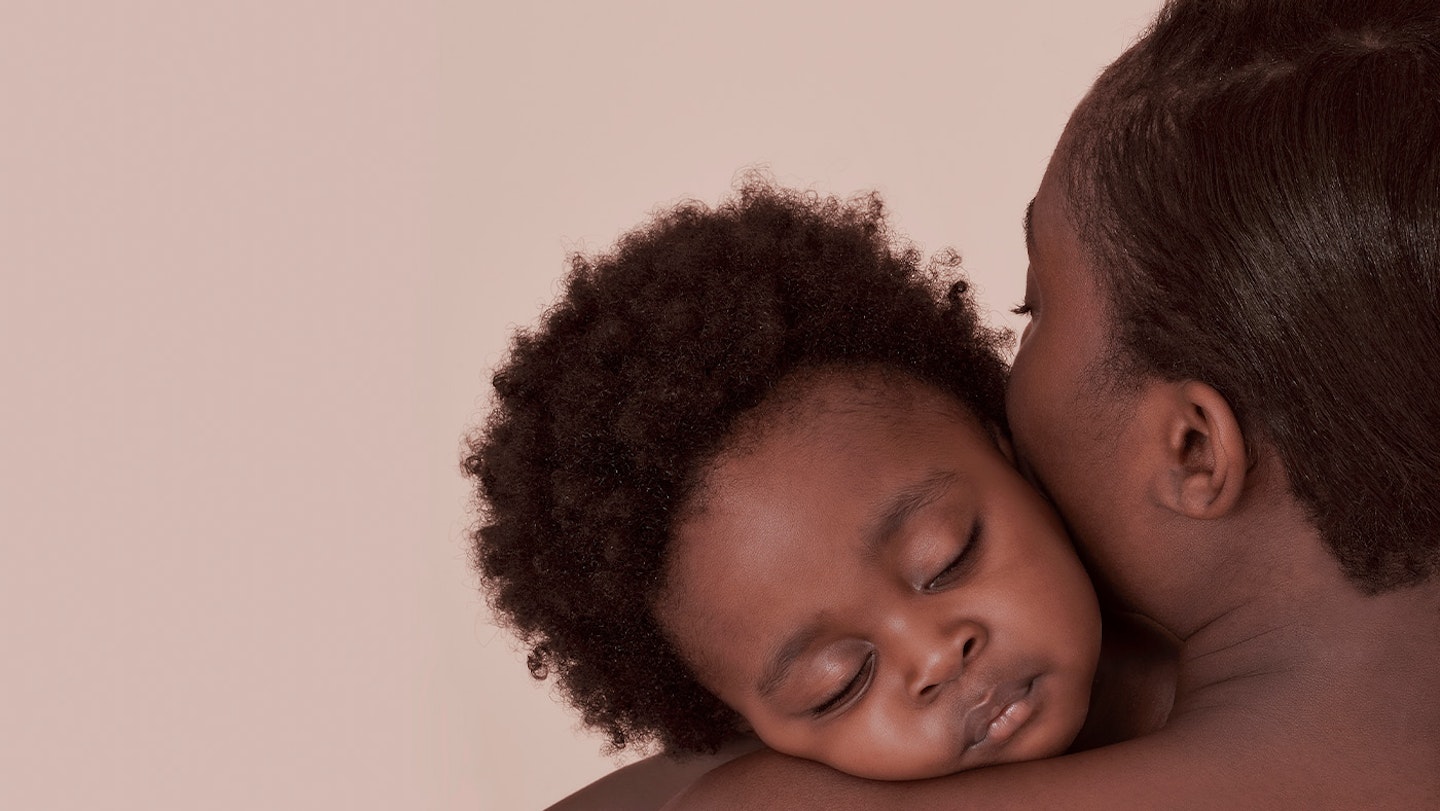One way to keep your baby happy and healthy is to make sure they get all the sleep they need. But (as any frazzled parent will attest) this is often much easier said than done.
This Morning’s sleep expert, bestselling author of Baby Secrets and creator of the acclaimed ‘spaced soothing’ sleep training method, Jo Tantum is on hand to share her top tips for better sleep for you and for baby, along with a few other childcare and sleep experts as well as some real mum hacks to complete our expert guide to help your little one settle.
Whether you have a newborn or a 12-18 month old toddler - you're sure to find a solution to your little one's sleep problem here.
1. Teach your baby the difference between night and day
Stephanie Modell, author of ‘The Baby Sleep Guide' says, 'During the day, give more verbal and physical interaction, go out for walks to provide light and fresh air and don't minimise normal daytime sounds when baby is napping. At night, keep the lights low or off, keep night feeds quiet and minimise interaction, keep their room warm and cosy but not too hot.'
2. Lay your baby down to sleep, drowsy but awake
'In the long term, this is key to helping your baby sleep through the night,' says Stephanie. 'If your baby can get to sleep independently at the start of the night, they're more likely to self-settle during the night in-between their many sleep cycles.'
3. Set a sleep routine
‘Having a different bedtime every day is not conducive to a healthy sleeping pattern,’ says health visitor Philippa Forsyth.
‘Babies thrive on knowing what to expect and when, which is why routines are ideal.’ If you want your baby in bed by 7pm, start with your first sleep cue, perhaps a warm bath, at 6.15pm. You could then follow with a massage, story or lullaby and cuddle in a low-lit room. Repeat this routine every night and they’ll soon recognise that it’s time to sleep.
'Having a good bedtime routine is proven to help babies settle better at night,' adds Jo. 'So for an hour before bedtime, have a quiet time without noisy toys, TV or screens. Then have a nappy off time (aged from six weeks to six months). After that comes a bath, massage and into pyjamas. Make sure the room is dimly-lit, with soothing sounds. Then feed.'
Keep it short and calm. Keeping the lights low will prepare your baby for sleep and help their natural levels of the sleep hormone, melatonin rise.
4. Establish a routine which does not involve feeding just before napping
'This will avoid your baby developing a feed-to-sleep association,' says Stephanie. 'A positive sleep/awake pattern to follow is: nap, feed, play/interaction, nap. This has the added advantage that your baby will be feeding when they have the most energy so is more likely to take a bigger, more satisfying amount which will encourage baby to go longer between feeds.'
5. Avoid props
'Help your baby learn how to fall asleep without a sleep prop, as this will interfere with their sleep. Sleep props can be feeding, rocking, patting, prams and car seats,' says Jo.
6. Know their rhythm
Babies work on a natural sleep cycle of 12 hours of day and 12 hours of night. So make sure your baby is going to bed 12 hours from waking, otherwise they will be overtired.
'Babies who don't have enough naps in the day will wake often in the night and be awake for up to an hour at a time. At three months they need a nap every hour-and-a-half after waking, and at six months every two hours,' adds Jo.
7. Let him self-settle
If your baby learns to settle themselves at bedtime, they’ll hopefully manage the same if they wake during the night.
‘Using the gradual retreat method helps,’ says sleep expert Wendy Dean. ‘Make sure your baby is awake when you put them in his cot, but maintain contact, such as a hand on baby's chest, until they falls asleep. Over time, you gradually distance yourself, sitting further away until your baby is able to nod off when you’re outside the room.’
8. Recognise his sleep cues
You can save your baby (and you) some unnecessary tears if you recognise the signs that they're ready to sleep. These include eye rubbing, yawning, crying or turning their head away from you when they're tired. ‘This is when you should try putting baby in their cot with minimal fuss, and let them settle themselves,’ says childcare expert Rachel Waddilove.
'Other sleep cues include rubbing ears, staring into space and, with newborns, rooting for a feed. Also write down the times your baby has a nap, so they won't be overtired,' adds Jo Tantum.
You can save your baby (and you) some unnecessary tears if you recognise the signs that they're ready to sleep
9. Do not disturb
Rush to your baby at their first whimper, and you could be making them more dependent on you for sleep. Babies rouse between sleep cycles and often have a grizzle, groan or babble, before going back to sleep. Give them a chance to re-settle themselves before rushing in, or you may inadvertently wake them.
‘All babies naturally wake up in the night as part of their sleep cycle, so give them a moment to see if they'll settle again,’ says sleep expert Andrea Grace. If baby continues crying, check that they're OK. ‘Try to avoid lifting them out of their cot, though. Use the gradual retreat method (above) instead,’ says Andrea.
10. Ban your bed
You’re knackered and you know your baby will relax if they're in bed with you – tempting, isn’t it?
‘Bringing your baby into bed with you is a bad habit you don’t want to encourage,’ says Wendy. ‘Instead, make their cot as comfortable and welcoming as possible with a musical mobile that plays a soothing song. This way they’ll see it as a safe and permanent sleeping place.’
11. Dream feeding
'A dream feed can really help a baby to start sleeping longer stretches at night. Babies can only sleep one long stretch per 24 hours so it makes sense if it's when you’re having your long stretch from, say, 11pm to 7am,' Jo continues, 'Lift your baby, change their nappy, feed, then resettle.'
12. Encourage that extra hour
'Babies have a light sleep around 5am to 6am, so encourage them to go back to sleep. Treat it as night time. That means no noise, talking, lights, nappy change or feeds. They will soon start sleeping longer,' advises Jo.
13. Create a good sleep environment
Your baby needs to have several triggers before going to sleep. 'I suggest blackout, wave sounds or white noise, a comforter, swaddle or sleeping bag and a story. Once your baby has these things they will sleep anywhere: on holiday, at their grandparents’ house and with friends,' says Jo.
14. Comforter tips
'From four months old, babies love to grab and hold things, because they are just realising that their hands belong to them. So having a comforter can really help them settle for nap times and in the night. I always use a muslin square as this is the lightest material you can get and is breathable. Knot it in the middle, so it's safe,' Jo adds. 'You can also put it down your top before you give it to your baby, so it smells of you, as it will comfort them.'
15. Blackout
'Use a blackout blind for naps as well as early mornings,' says Jo. 'Blackouts help a baby to de-stimulate and calm. They don't yet understand that they need to close their eyes to shut out the light like we do. Use blackout for naps in the pram and at home and your baby will sleep better.'
More baby sleep tricks that real mums swear by
You may have read hundreds of books on baby sleep, but sometimes the advice that actually works comes from other mums – take your pick from the following...
Baby sleep tricks newborn to six months
 1 of 7
1 of 71) Find their settling song
‘I always sang Love Me Tender by Elvis to Harry. After I put him down, I’d hum it by the cot and continue until I made my escape. He was sleeping through at 18 weeks and, if he ever woke up, I’d do the same and he’d instantly settle.’
Rachel, 35, from Surrey, mum to Harry, 19 months
 2 of 7
2 of 72) Warm the cot
‘Maisie would wail when put in her crib, but was happy to go down after a night feed. A midwife suggested it was because her bed was cold. So I placed a warm hot-water bottle in while she fed, so the sheet was at body temperature, and took it out before putting her in.'
Katie, 29, from Lincs, mum to Maisie, three months
 3 of 7
3 of 73) Replicate a heartbeat
‘Keep a ticking clock in the nursery. The repetitive sound is similar to a mother’s heartbeat when she’s in the womb, and I’m sure my daughter was reassured and came to associate it with sleep. She was sleeping through at 12 weeks.’
Stephanie, 26, from Wilts, mum to Florence, six months
 4 of 7
4 of 74) Phase out unnecessary feeds
‘Once Sacha was 14 weeks, my health visitor advised me to dilute his 4am feed with water as he was a good weight. She said he’d quickly drop it, especially as he was having a “dream” feed at 11pm. After a week of taking his diluted feed, he stopped waking up for it.’
Jules, 36, from London, mum to Sacha, two
 5 of 7
5 of 75) Discourage power napping
‘If your baby sleeps 10 minutes here, 15 minutes there throughout the day, he won’t think anything of doing the same at night. Make sure he has an extended sleep in the day to help him to sleep for a longer period at night.’
M&B sleep expert Tina Southwood
 6 of 7
6 of 76) Stroke their nose
‘Dion used to scream at bedtime, which made me feel helpless. Then I read how stroking a child’s nose in a downward motion can be soothing and encourage her to close her eyes. Now, even if I have to go to Dion in the night, the process takes under five minutes.’
Michelle, 21, from Cheshire, mum to Dion, 21 months
 7 of 7
7 of 77) Make the room calm
‘We used to have a cot bumper, mobiles, cuddly toys and a light show in George’s room, but he still screamed at bedtime and in the night. My mum pointed out how manic his nursery was, so we removed most of the gadgets. Yep, he slept better.’
Lucinda, 24, from Bucks, mum to George, 10 months old
Popular articles to read next
When to start sleep training | Sleep training methods explained
An age by age guide to understanding your baby's sleep cycle
